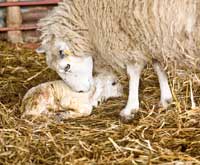Bad weather at lambing could trigger coccidiosis

As lambing approaches, sheep farmers are being advised to be on the look out for coccidiosis – with lambs aged three to eight weeks most vulnerable.
And because bad weather can stress lambs, it means it can also be a trigger for coccidiosis, with farmers advised to be alert to disease occurring two to three weeks after a stressor event, according to Janssen Animal Health.
The eimeria parasite causing coccidiosis is widespread in the UK and young animals including calves may be infected by oocysts shed by asymptomatic carriers or older infected lambs.
Low levels of challenge can help animals develop immunity but exposure to high oocyst numbers, particularly in combination with stress, can lead to clinical and sub-clinical forms of the disease. Gut damage is the main problem in clinical and sub-clinical cases, causing depressed weight gains.
In order to reduce risk of infection, Janssen Animal Health suggests reducing stock density, improving hygiene and avoiding stress, as well as treating at-risk lambs preventatively. All lambs in the batch should be given a coccidial treatment at age four to eight weeks of ages, two weeks after a stressful event, such as bad weather.
